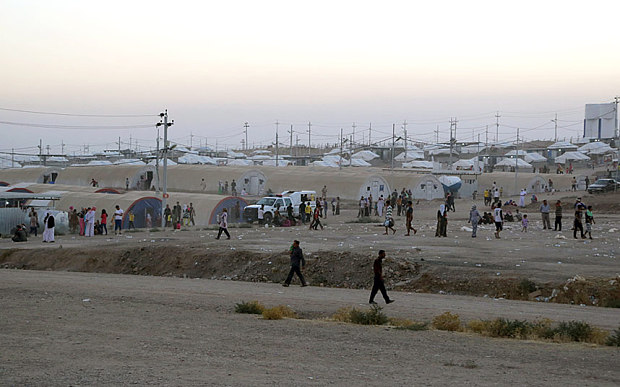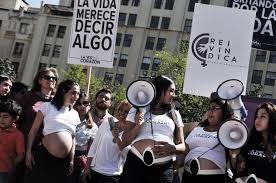A number of my friends and acquaintances on Facebook this week have expressed their surprise, given Pope Francis’s record of making statements very critical of war (as in connection with Syria a year ago), and given the Vatican’s criticism of the US-led war in Iraq over a decade ago, that senior Vatican Catholics are now saying that US military strikes against the Islamic State’s forces are necessary. Christians and other religious minorities in northern Iraq, such as the Yazidis, are being murdered and, as Adama Dieng and Jennifer Welsh, who are Special Advisers for the Secretary-General of the UN, warned yesterday, these acts “constitute grave violations of human rights and international humanitarian law and may amount to war crimes and crimes against humanity.” They also indicated that these acts by the Islamic State may point to the risk of genocide. In the past, efforts to do something about such crimes were called “humanitarian intervention.” In recent years, it has come to be referred to as the “responsibility to protect” (R2P). It has gained traction at the UN and has been affirmed by the World Council of Churches. Pope Benedict XVI mentioned R2P in his address to the General Assembly of the UN on April 18, 2008, and he called for its implementation in his social encyclical Caritas in veritate, which was issued on June 29, 2009. I have written about this a number of times, including here.
Indeed, in recent years, especially in view of humanitarian crises such as in Rwanda and Kosovo, the Church has used the language of “legitimate defense” of the innocent as a just cause for forceful intervention. When people suffer at the hands of their government or due to the lack of the ability of their government to protect them, Pope John Paul II claimed that other nations “no longer have a ‘right to indifference’ [and it] seems clear that their duty is to disarm this aggressor if all other means have proven ineffective” (Pope John Paul II, “Principles Underlying a Stance Toward Unjust Aggressors,” Origins 22, no. 34 [28 January 1993]: 587). Similarly, Pope Benedict XVI , in his second World Day of Peace message, devoted attention to “certain recent situations of war” (par. 14), calling on “the international community [to] reaffirm international humanitarian law, and apply it to all present-day situations of armed conflict, including those not currently provided for by international law…” (par.14). He encouraged the world’s nations to establish “clearer rules” and “norms of conduct” for defending the innocent and limiting “the damage as far as possible,” while he concurrently repeated the refrain that “war always represents a failure for the international community and a grave loss for humanity” (par. 14). What might these “clearer rules” or “norms of conduct” look like? Here Benedict footnoted the section of the Catechism of the Catholic Church (par. 2307-2317) that lists (in small print) “the traditional elements enumerated in what is called the ‘just war’ doctrine” (par. 2309), and that Benedict regarded as offering “strict and precise criteria” (endnote 7).
So this is the context from which to understand the recent comments by Vatican officials. Archbishop Giorgio Lingua, the Vatican’s nuncio to Iraq, told Vatican Radio, “This is something that had to be done, otherwise (the Islamic State) could not be stopped.” Likewise, Archbishop Silvano Tomasi, who is the Vatican’s top official at the UN in Geneva, said that in the short run “practical action,” including “even effective military protection,” is needed. Another Vatican diplomat said, “No one here is celebrating, but when people are at risk, they have to be defended. That’s clear.”
Again, this is about limited military action to defend the innocent. It is not about taking sides, except for the side of civilians who are at risk of genocide. The Vatican isn’t allying itself with the US. It would prefer intervention by a UN force or by a coalition; however, in the absence of these, and given the clear and present danger, US military action is being viewed as necessary. According to David Gibson, Pope Francis, in a letter to UN Secretary-General Ban Ki-moon, called for “concrete acts of solidarity” by the UN, which includes security forces as part of the solution,but “he was careful not to promote a military response as the chief means for resolving the tragedy.” The Vatican’s position, therefore, does not seem, in my view, exactly the same as that expressed by the 50 religious leaders, as described by Gibson, “led by mostly conservative Catholic, evangelical and Jewish activists, [who are] calling on President Obama to sharply escalate military action against Islamic extremists in Iraq.”
Over at the Boston Globe, John L. Allen Jr. tries “Explaining the Vatican’s surprising pro-US line on Iraq,” but I don’t think it is so surprising–nor do I think it is “pro-US,” but instead is “pro-innocent human life.” See also Josephine Mckenna and David Gibson’s report “On Iraq, Pope Francis’ message of peace meets reality of war,” for Religion News Service, which was picked up by the Washington Post. This report on the topic from Catholic News Service appeared later today, covering some of the same ground: http://www.catholicnews.com/data/stories/cns/1403362.htm.






Dr Winright,
This is a helpful piece, and I am glad that some of the Christians and Yazidis have the cover to escape. So many have died or are suffering at the hands of their captors!
The description of R2P reminded of Francisco de Vitoria’s treatment of humanitarian intervention in De Indiis 3.5 (1539). Obviously it is not the modern doctrine, but Vitoria supplies the seed.
A question: what kind of action by the UN short of a security force/military response would be effective with the Islamic State?
The Vatican is late in its prudential judgement for military means as is Obama. Only after thousands of people were on the top of Sinjar mountain on CNN did either act but this was after 6 year old girls were beheaded in Mosul atop thousands of other enormities, beheadings and back of head shootings. The videos of Sinjar forced both Obama first then the Vatican to act. Pathetic. Christ did not meet for months with the disciples when He saw the moneychangers in the temple and He didn’t seek dialogue with the offenders first. He acted. Thousands were killed by ISIS but only when a hellish photo op occurs on Sinjar Mountain…did either Obama or the Pope act.